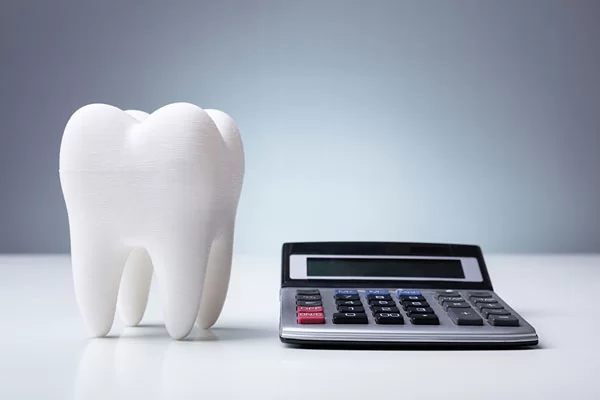Key Takeaways
- Single dental implant cost in Hilliard: $3,500 to $5,000, including implant post, abutment, and crown
- Full mouth dental implants: $20,000 to $50,000 per arch with All-on-4 treatment
- Multiple tooth implants: $6,000 to $15,000 for implant-supported bridges
- Additional procedures: Bone grafting ranges $500 to $3,000, depending on complexity
- Local financing options: Payment plans, CareCredit, and HSA/FSA accepted at our Hilliard dentist office
- Insurance coverage: Most plans partially cover crowns and related procedures, reducing out-of-pocket costs
Are You Looking for a Dental Implant Dentist Near You in Hilliard?
When you’re missing teeth, finding the right solution affects not just your smile but your oral and overall health, confidence, and quality of life. Dental implantshave become the gold standard for tooth replacement, offering a permanent solution that looks, feels, and functions like natural teeth.
Ready to restore your functional smile? Our experienced implant dentist in Hilliard, OH, serves patients throughout Columbus, Dublin, Upper Arlington, Grove City, Westerville, and surrounding Central Ohio communities. Contact our dental practice in Hilliardtoday at (614) 771-6060to schedule your consultation and discover how affordable dental implants can transform your life.

How Much Do Dental Implants Cost in Hilliard, Ohio?
Understanding dental implant costs helps you make an informed decision about your oral health investment. Current dental implant costs average between $2,000 and $4,500 per tooth, though prices in Hilliard typically range from$3,500 to $6,000 per implantwhen including all components.
Detailed cost breakdown for Hilliard patients:
- Single-Tooth Dental Implants: $3,500–$6,000
- Implant-Supported Bridge(3-4 teeth): $8,000–$15,000
- Multiple Tooth Implants(individual): $10,500–$24,000 for 3-4 teeth
- All-on-4 Dental Implants(full arch): $25,000–$50,000
- Implant-Supported Dentures(removable): $15,000–$30,000 per arch
- Full Mouth Dental Implants(fixed): $40,000–$80,000 for both arches
Pre-Treatment Supplemental Procedures:
- Bone Grafting: $500–$3,000
- Sinus Lift: $1,500–$3,000
- IV Sedation: $300–$800 per appointment
- 3D Imaging and Consultation: $100–$300
The cost of your dental implant treatment varies. Schedule your consultation at our Hilliard dentist office by calling (614) 771-6060for a personalized treatment estimate.
What Factors Determine Your Dental Implant Treatment Cost?
Multiple factors influence the final cost of your dental implant procedure. Understanding these helps you budget effectively and feel comfortable with your investment in oral health.
Primary cost factors:
- Number of Implants Needed: Whether you’re replacing a single missing tooth or need full mouth dental implants dramatically affects cost. Four implants supporting a full arch (All-on-4) cost less than individual implants for each missing tooth.
- Implant Materials and Quality: Titanium implants are the most commonly used due to their excellent success rate and lower cost. While zirconia implants offer a metal-free option that is preferred by some patients despite being slightly more expensive.
- Bone Health and Existing Bone Structure: If you lack sufficient existing bone in your upper or lower jaw, bone grafting may be necessary before implant placement, adding to treatment cost but ensuring long-term success.
- Geographic Location: Dental implant costs in Hilliard, Ohio, reflect regional economic factors. Our practice offers competitive pricing while maintaining the highest quality standards.
- Dentist Experience and Technology: Our experienced implant team uses advanced 3D imaging and guided surgery techniques, ensuring precise placement and optimal outcomes for your investment.
- Additional Comfort Options: IV sedation helps patients feel comfortable during longer procedures, especially beneficial for multiple implants or complex cases involving bone grafting.
Dental Insurance Coverage for Dental Implants
Most dental insurance plans don’t fully cover implant costs, but many provide partial coverage that significantly reduces your out-of-pocket expenses:
- Dental crowncoverage: 50-80% coverage when placed on an implant
- Surgical procedures: Some plans cover extractions and bone grafting
- Annual maximums: Typically $1,000-$2,000, which helps offset total costs
- Medical necessity: Accident-related tooth loss may qualify for medical insurance coverage
Pro Tip: Our team will submit a pre-authorization request to your insurance provider to determine exact coverage before you begin treatment.
Flexible Financing Solutions for Dental Implants
We believe everyone deserves access to quality dental care. Our Hilliard dental practice offers multiple financing options:
- In-house payment plansoffer 12-36 month schedules with low or no-interest options, customized to fit your family budget.
- For third-party financing, CareCredit provides 0% interest promotional periods (6-24 months), and Wells Fargo Health Advantage offers flexible loan terms with a quick, often same-day, approval process.
- Health Savings Accountsallow the use of pre-tax dollars from HSA, FSA, or HRA accounts, leading to significant tax savings on your dental implant investment with no restrictions on implant procedures.
Why Choose Dental Implants Over Traditional Alternatives?
While the initial investment in dental implants is higher than traditional dentures or bridges, the long-term benefits make them the superior choice for most patients:
- Durability and Longevity:Dental implants can last a lifetime with proper care, while traditional dentures typically need replacement every five to seven years, and bridges last 10 to 15 years.
- Oral Health Benefits:Dental implants prevent bone loss in the jaw, don’t require alteration of adjacent healthy teeth, maintain facial structure and prevent premature aging, and support overall oral health.
- Quality of Life Improvements:Enjoy all your favorite foods without restriction, speak clearly and confidently, and avoid embarrassing slipping or clicking sounds, messy adhesives, or special cleaning routines.
- Cost Analysis Over Time:A single implant costing $4,000 today versus dentures requiring replacement every five to seven years demonstrates the long-term value of the implant investment.

Frequently Asked Questions
Can I find affordable dental implants near me in Hilliard, OH?
Yes! Our Hilliard dental practice offers competitive pricing and multiple financing options to make dental implants accessible. We also work with several insurance providers and offer in-house payment plans. Additionally, check with:
- Ohio State University College of Dentistry for reduced-cost treatment by dental students
- Franklin County community health centers offering sliding fee scales
- Veterans’ dental programs for qualifying service members
What makes dental implants worth the cost for Ohio residents?
For our Central Ohio patients, dental implants provide:
- Weather resilience: No issues with Ohio’s temperature changes affecting fit
- Lifestyle benefits: Enjoy local favorites like Columbus food festivals without dietary restrictions
- Long-term savings: Avoid repeated replacements needed with other tooth replacement options
- Confidence: Professional and social benefits are important in Ohio’s business communities
- Health protection: Maintain jawbone health despite Ohio’s aging population trends
Does Medicare cover dental implants for Ohio seniors?
Standard Medicare doesn’t cover routine dental implants. However:
- Medicare Advantageplans may offer dental benefits
- Medical necessitycases (accident-related) might qualify for coverage
- Supplemental insurancecan help with costs
- HSA accountsfrom previous employment can fund treatment
Our team helps Ohio seniors navigate insurance options and find affordable solutions.
Can I get free or low-cost dental implants in central Ohio?
Yes, there are several options for reduced-cost dental implants in the Columbus area. Check with local community health centers, the Ohio State University College of Dentistry for student clinics, and organizations that serve veterans or low-income individuals. Some non-profit dental clinics in Franklin County also offer sliding fee scales based on income.
Take the First Step Toward Your New Smile
Don’t let missing teeth impact your quality of life any longer. Our experienced team at Fishinger Dental in Hilliard, Ohio, is ready to help you explore your options and determine the right solution for your specific needs.
Contact our Hilliard dental practicetoday at(614) 771-6060to schedule your dental implant consultation. Fishinger Dental proudly serves patients in Hilliard, Columbus, Dublin, Upper Arlington, Grove City, Westerville, and all of Central Ohio.





